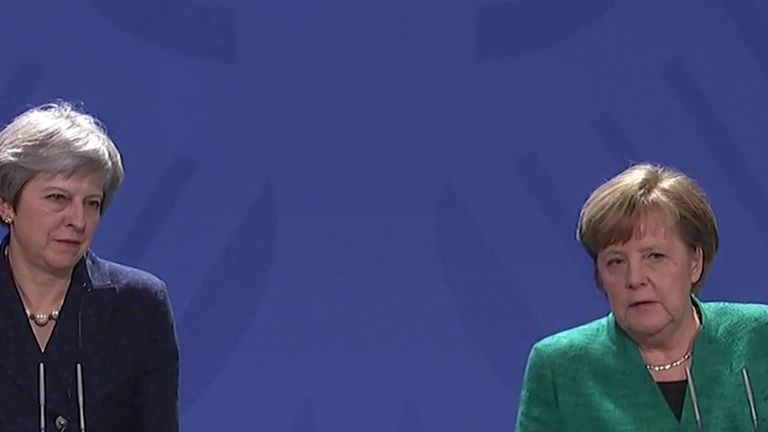Angela Merkel boosts Theresa May's hopes of a bespoke Brexit deal
The German Chancellor wants a EU-UK relationship "as close as possible" once Britain has left the bloc in 2019.
Friday 16 February 2018 18:35, UK
Theresa May's hopes of securing her preferred kind of Brexit deal have been given a boost by Angela Merkel.
The German Chancellor suggested a future trade agreement between the EU and UK, if not based on any existing models, would not necessarily represent "cherry-picking".
Mrs Merkel's position offers a more positive outlook on Brexit talks than that previously presented by EU chief negotiator Michel Barnier.
The European Commission official has repeatedly warned the UK faces a choice between a Norway-style relationship with the bloc - with Britain remaining in the EU's single market but accepting obligations such as free movement rules - or a Canada-style free trade deal, which could limit the UK's access to EU markets for services.
The Prime Minister has previously ruled out both options for Britain's future relationship with the EU, despite the warnings from Brussels that the UK will not be able to conduct "cherry-picking" between the two options.
Mrs Merkel offered encouragement to Mrs May, following discussions between the pair in the German capital on Friday, as she outlined a deal that is "as close as possible" between the UK and EU but "different" to Britain's current EU membership.
Asked whether she viewed the Prime Minister's wish for a bespoke Brexit deal, not based on any current models, as "cherry-picking", the Chancellor replied: "In the end, the outcome needs to be a fair balance, that deviates from the single market and not as close a partnership as we've had, but I think one can find that.
"And we [the remaining 27 EU members] will be very carefully vetting that process and see to it that it is as close as possible, but that it is different to what Britain currently has as a member, which is what they want, which is what the British people want.
"But this does not mean that it needs to be cherry-picking."
The German Chancellor insisted the EU27 has not changed their stance on Britain's departure from the EU, admitting they "deplore it".
But she added: "We want to adopt a constructive position because we want to have as close as possible partnership with Britain even after leaving the EU both economically and politically."
Mrs Merkel also dismissed suggestions both she and Brussels are growing fed up with a delay in the UK setting out its plans for the next phase of Brexit talks, on the future economic relationship, as the Prime Minister battles to win an agreed position among her Cabinet ministers.
"I'm not frustrated at all," she said.
"I'm just curious how Britain envisages this future partnership."
Appearing alongside her German host, the Prime Minister spoke of her wish for a "bold and ambitious partnership", but stressed it was bit a "one-way street" as such an outcome would also benefit the bloc.
Mrs May denied that it was up to the UK to set out its position, rather than for the EU to make an offer on a future trade deal.
She said: "The point of negotiations is two parties sit down and talk about these issues and come to an agreement about those issues.
"We have, at different stages, set out and clarified different aspects of the future relationship that we want to have with the EU."
The Liberal Democrats said Mrs Merkel's use of the term "curious" was a "diplomatic way of saying 'nonsensical'".
Brexit spokesman Tom Brake added: "The Conservative civil war is raging so violently that they have no battle plan for Brexit, which is why the issue everyone agrees on - that there must be no hard border between Northern Ireland and the Republic of Ireland - somehow remains a possibility."
As part of her trip to Germany, the Prime Minister will outline her wishes for a future security EU-UK partnership in a speech at a security conference in Munich on Saturday.
Ahead of her address, Mrs May said: "We're all facing the same challenges and threats and now is not the time for us to reduce cooperation.
"Now is the time for us to look to see how we can develop on the existing cooperation in a way that's going to be dynamic and agile for the future.
"Because as the threats evolve, as they grow, as they don't recognise borders, so we need to continue that cooperation and be able to adapt to the threats as they come."





